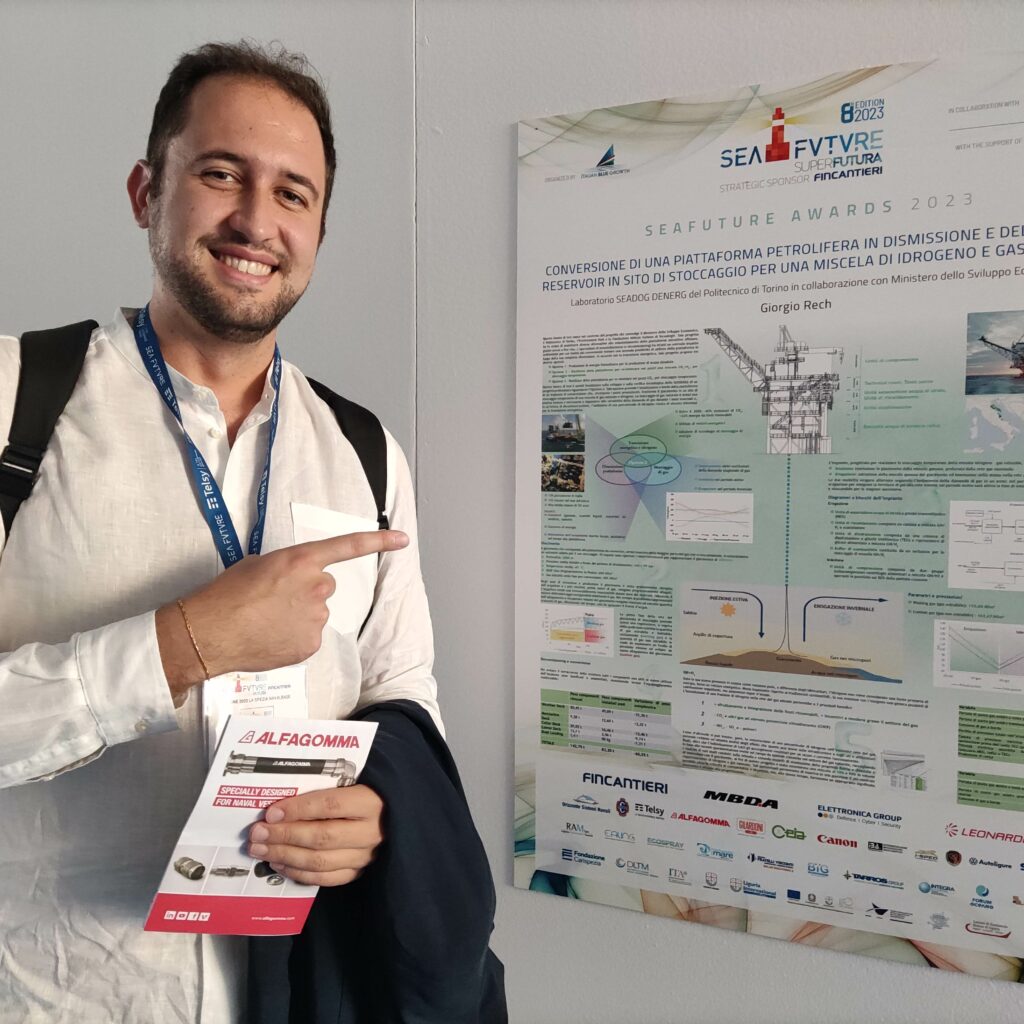Giorgio Rech, Winner of Seafuture Awards 2023: "My Thesis is Now Open to Other Important Studies, I’m Grateful for the Experience”

As we eagerly anticipate the next generation of young talents in the fields of innovation and Blue Economy at the 2025 edition of the Seafuture Awards, we take a moment to reflect on the 2023 winner, Giorgio Rech. The Seafuture Awards, promoted by the Ligurian District of Marine Technologies and Italian Blue Growth, celebrate pioneering efforts in the blue economy, and Giorgio’s remarkable project was recognised during the ninth edition of Seafuture.
Giorgio, 30, from Turin, holds a degree in energy and nuclear engineering. His award-winning thesis focused on the conversion of decommissioned oil platforms. Let’s take a closer look at his journey, the inspiration behind his project, and the developments that have followed.
1) What inspired you to present a project on the conversion of decommissioned oil platforms? Was it driven by a passion for sustainability, or did it stem from your academic background?
It was a bit of both. The idea emerged at the end of my studies in energy and nuclear engineering, particularly after participating in a post-pandemic video conference. The conference was organised by the team that would later guide me through my thesis. Led by Professor Andrea Carpignano from Politecnico di Torino, the team proposed three potential thesis topics as part of a project supported by the Ministry of Economic Development (MiSE). One of these topics stood out to me: converting oil platforms into underground storage sites for a mix of natural gas and hydrogen.
At a time when energy production must become more efficient while respecting our planet, I saw this as an opportunity to combine multiple interests: energy engineering, hydrogen as a key player in the energy transition, and the environmental benefits of preserving marine ecosystems. I decided that this would be the perfect conclusion to my academic studies. I felt that with this project, I could address three critical areas—energy storage, the future of hydrogen, and the environmental challenge of decommissioning platforms. So, I applied, and after a brief interview, I was fortunate enough to be selected.
2) What did winning the Seafuture Awards mean to you?
Winning the Seafuture Awards was a tremendous personal achievement. It was a validation of all the hard work put in by my team and me, and all the guidance and support I received throughout the process. To see our efforts recognised by such a distinguished group, in the context of Seafuture, at the Italian Navy base se ti riferisci all’arsenale va messo at La Spezia Naval Base, alongside the Amerigo Vespucci, was incredible. I am deeply grateful for the opportunity and the recognition from the Seafuture team and the broader industry.
3) Has your project evolved since then?
Yes, the methodology behind my thesis has continued to inspire further research. The concepts I developed were used as a reference for a study exploring the potential of converting oil platforms into permanent carbon dioxide storage sites, preventing its release into the atmosphere by confining it underground. This follow-up work was done by another graduate student, again with Professor Carpignano’s team and the RAMS&E company in Turin, where I completed my internship. The Polytechnic and RAMS&E team have continued to promote our work through scientific publications, keeping me informed of the progress.
4) What are you working on now?
After completing my degree, I joined a multinational company in the rail sector, located just outside Turin. Over the past two years, I’ve delved into the area of RAMS engineering (Reliability, Availability, Maintainability, and Safety), focusing on the methodologies used to ensure the reliability and safety of plant systems. This field caught my attention during my studies and was also a significant part of my thesis. I still hold this position within the company, and I’m proud that my recognition at the SeafutureAwards has been met with congratulations from colleagues around the world.
Giorgio Rech’s journey demonstrates the powerful intersection of academic research, innovation, and environmental stewardship in the evolving Blue Economy. His work on the conversion of oil platforms showcases the potential for sustainable solutions in energy and the preservation of marine ecosystems. As we look forward to the next generation of innovators in the 2025 SeafutureAwards, Giorgio’s experience stands as an inspiration to young talents seeking to make a meaningful impact.

